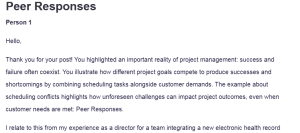Peer Responses
Person 1
Hello,
Thank you for your post! You highlighted an important reality of project management: success and failure often coexist. You illustrate how different project goals compete to produce successes and shortcomings by combining scheduling tasks alongside customer demands. The example about scheduling conflicts highlights how unforeseen challenges can impact project outcomes, even when customer needs are met: Peer Responses.
I relate to this from my experience as a director for a team integrating a new electronic health record system. While we managed to migrate to the new system, the process took far longer than anticipated, resulting in higher labour costs and employee dissatisfaction. Your scenario where you are working with such a smaller set of operators leads to the thinking that backup plans are critical. I have seen teams face burnout due to the quality of the project or all the effort, which can be avoided.
Considering the downsized team, it’s even more impressive that you could avoid mistakes. This underlines the relevance of team spirit and flexibility in facing challenges. However, even if some goals are not reached, with a focus on quality, customer satisfaction, and added value for customers, the project is a success overall.
Person 2
Hello,
This is a great post! Your point about a project’s success being tied to its lasting value is thought-provoking. It reminds me of a program at a hospital where I worked that started as a telemedicine program focused on improving access for rural patients. Initially, adoption was low among its intended audience, but later, it found value for a larger patient population, more than ever imagined.
This mirrors your example of the community centre, where success can change as needs and circumstances evolve. Your distinction between project execution and results is also something I appreciate; a well-executed project can feel empty if there is no value generated. This situation can be mitigated if the goals align with what stakeholders want.
Your insight is a perfect example of how manageability and the willingness to embrace new opportunities can convert perceived failures into meaningful successes over time. It’s a reminder that notions of success can evolve with changing circumstances. Strong project management must account for long-term potential as well as immediate goals.
ORDER A PLAGIARISM-FREE PAPER HERE
We’ll write everything from scratch
Question 
Instruction:
- Reply to the following people: Follow-on responses may include personal reflections, support from concepts within the text, sharing personal experiences, or use of real-life company examples
- Follow-on responses may include personal reflections, support from concepts within the text, sharing personal experiences, or use of real-life company examples
Person 1
Projects can be successful and unsuccessful at the same time as there are many aspects to consider. To be successful in a project, there must be set guidelines to follow in terms of deadline, cost, resources, and needs of the customer. One example of being both successful and unsuccessful during a project would be having scheduling conflicts where a project does not meet deadlines, which would result in higher costs but still meeting the customer specifications.
Success in that situation would be meeting specifications, and the unsuccessful portion would be not meeting deadlines and higher cost than expected. Another example would be how the team functions, does one person do all the work (unsuccessful) while the needs of the customer are still fulfilled (successful). Many things can happen during a project and there should be backup plans, especially for resources needed.
I have recently completed a small project at work. Due to unforeseen circumstances our team of six operators turned into two operators by the finalizing of the project. We were successful in completing the project, it was just a day later than anticipated. By having less operators than originally planned, operators started to get overworked and tired by the end, thankfully this did not result in mistakes, but would be considered unsuccessful.

Peer Responses
Person 2
I think qualifying a project as successful really depends on the strongest initial intentions of the projects goal and the lasting effect the project will have regardless of efforts. As mentioned in class, a project is a unique job that has an end goal of providing some sort of value. If the project sees completion to its end successfully but does not provide value of original intent, the project can be argued to be unsuccessful even though the creation of the project went smoothly. However I think that even if a projects original intended value is not provided but then sometime down the road creates another use could then redeem the project as successful.
Example being a project to build a community center marketed towards a younger audience. Upon construction the community center does not bring in younger people, failing to provide the intended value. Time goes on and the community center ends up being used by many older people shifting the value given. I am sure there are better and more realistic examples but I wanted to display how a successfully made project can still be argued as unsuccessful and how a “failed” projects unforeseen use can be argued to become successful.
less